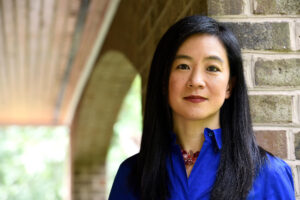The agenda provides tangible steps for conservative leaders to increase trust in U.S. elections among Republicans. It arrives as new polling from Gallup and the Johns Hopkins SNF Agora Institute shows that only 40% of Republicans are very or somewhat confident in the accuracy of U.S. elections, a drop from a peak of close to 90% confidence in 2006.
The work, including full results of the poll, will be released during the first convening for “Building a Conservative Agenda for Democracy,” today at the new Johns Hopkins University Bloomberg Center in Washington, D.C. More than 80 leaders involved in the project are expected to attend.
Over the past year, the Johns Hopkins SNF Agora Institute and R Street have organized off-the-record meetings in Washington, D.C., Utah, Indiana, and Texas, bringing together election officials, advocates, and scholars working in the democracy and election sphere to explore the contours of a pro-democracy movement for conservatives. The conversations have helped to spur a set of principles to help conservative leaders shore up confidence in American elections within their communities. The core principles are:
- Publicly affirming the security and integrity of elections across the U.S. and avoiding fueling doubt about elections in other jurisdictions.
- Using transparency and public outreach to reassure voters of election integrity.
- Championing policy changes that can help build trust in the elections system.
Read the full statement of principles in this PDF.
“As Republican state election officials, we believe in the power of citizens to choose their leaders freely and fairly, and we have faith in the integrity of election systems in place to carry out the voters’ will,” Georgia Secretary of State Brad Raffensperger said in a joint comment with other architects of the project, Idaho Secretary of State Phil McGrane, Kansas Secretary of State Scott Schwab, and Utah Lt. Gov. Deidre Henderson. “We are also worried. Our democracy cannot hold if its citizens do not trust that elections accurately reflect the will of the people.”
Added Scott Warren, co-organizer of the initiative and a fellow at the SNF Agora Institute: “Shoring up the foundations of American democracy requires a trans-partisan effort designed to protect the basic parameters, rules, and institutions of the American republic. Too many democracy reform initiatives do not focus or involve conservatives in a substantive way. Our convenings, and the polling work we’ve done, demonstrates the importance of centering conservatives in the democracy reform arena. We’re proud of the principles we’ve helped to create that will help to restore trust in elections across the political spectrum, and know that this work is just beginning.”
Gallup has surveyed attitudes about election integrity for the past 20 years. An October 2023 poll of 2,012 U.S. adults, sponsored by the Hopkins Bloomberg Center, is one of the first attempt to understand the difference between conservatives who believe former President Trump won in 2020 and those who believe President Biden won.
Key findings include:
- Among conservatives who believe Trump won the 2020 election, only 57% say it is important to accept the outcome of an election even when their preferred candidate loses. In contrast, 79% of conservatives who accept that Biden won and 80% of Liberals/Democrats believe such acceptance is important.
- Only 40% of Republicans said they were very/somewhat confident in the accuracy of U.S. elections, a stunning drop from a peak of about 90% confidence in 2006. Meanwhile 80% of Democrats and 67% of independent voters have confidence in U.S. elections.
- Among all Americans, less than 50% trusted “completely” or “a lot” that votes would be counted accurately, whether they were electronic, mail-in, or conventional paper ballots.
- Conservatives who believe Trump won the 2020 election expressed by far the lowest levels of strong trust in the accuracy of vote counting, particularly for ballots cast by mail, with only 13% trusting “completely” or “a lot.”
- More Americans have stronger trust in the integrity of elections in their own states (47%) than in other states (30%).
- When asked about accepting the 2024 presidential election results if they lose, Americans believe that 48% of Democrats will accept it while only 28% of Republicans will.By JHU Hub staff reporterPublished Nov 8

